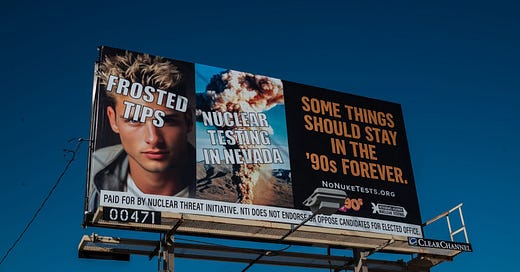Forced to Listen, Government Hears from Locals in Nuclear Weapons Towns
From South Carolina to California, locals in nuclear weapons towns raise health, safety, and environmental concerns over renewed plutonium pit manufacturing.
Hi,
There’s not many official venues in which everyday Americans get to tell their government what they think about the new nuclear arms race. But a few remarkable turns of events have recently created the opportunity to do just that. Chief among those was a legal victory by grassroots plaintiffs against the National Nuclear Security Administration, which is forcing the latter to carry out listening sessions in nuclear weapons industry towns across the country.
The extensive environmental impact study is a rare speed bump that everyday Americans have been able to place in the way of the 21st century’s new nuclear arms race. Additionally, a local campaign in Nevada to oppose a resumption of nuclear weapons testing outside Las Vegas brought together groups as diverse as the Nevada Resort Association, which represents casinos, a major labor union, military veterans, multiple chambers of commerce and the Nevada Cattlemen’s Association. Young campaigners pamphleted on college campuses put up slick billboards throwing shade on nuclear weapons testing as a passé thing of the 90s. The result? A state legislature in May voting unanimously – that’s right, Republicans too, even though resumed nuclear weapons testing is part of Project 2025 – to back the anti-testing resolution.
Courtesy of Nevadans Against Nuclear Weapons Testing
Furthermore, nuclear weapons town halls were held across Montana last month, during which the Air Force had the awkward assignment of explaining to locals why the missile their towns were expected to host in siloes was hitting speed bumps of their own, those in the form of government cost-cutting mandates and a suspension of silo design and construction work.
“A nuclear arms race can feel abstract and distant, but it very much isn’t,” Ravi Garla, a consultant for the Nuclear Threat Initiative, told Inkstick. Garla recently worked on a campaign that led to a unanimous vote in the Nevada state legislature to oppose any resumption of explosive nuclear tests at a desert site outside Las Vegas where the government carried out more than 900 tests during and after the Cold War.
“Advocates and activists need to give the arms race a heartbeat, a zip code, to share the human impact, and give it a place and proximity to really connect the story and make it make sense,” Garla added.
The NNSA started to carry out its agreement to listen to Americans’ environmental concerns by hosting two large Zoom meetings in late May, which were just the first form of public consultation that the government has to carry out. Neighbors of nuclear sites overwhelming opposed the production of new plutonium pits — 68 people spoke out against the move, while only five supported it.
A protest in May outside the Kansas City National Security Campus, which makes components for nuclear weapons (Photo courtesy of Jim Hannah)
The hearings highlighted how Americans see nuclear weapons production in their backyards: not just as an issue about weapons of mass destruction but also as an industry that produces a litany of quotidian concerns.
One Montanan asked the Air Force if the housing built to shelter construction workers at Montana missile sites could be permanent rather than temporary in order to become homes for impoverished military veterans. A labor union in the state expressed its eagerness to be contracted for construction jobs on missile silos. Locals from industry towns across the country sounded the alarm over cancer risks in and around nuclear sites and the government’s procrastination on properly disposing of nuclear waste still leftover from the last century’s arms race. One oil and gas industry envoy representing the Permian Basin in Texas and New Mexico opposed new plutonium pit production because radioactive spills threaten petrochemical sites. Other participants raised security concerns, like alarm over earthquake fault lines near nuclear plants and fears that terrorists could attack nuclear waste dumps like the Waste Isolation Pilot Plant in southern New Mexico. And while some local boosters said they welcomed the influx of a new round of federal spending that would create jobs in towns that largely depend on government contracts, one South Carolinian bemoaned the “economic stigma” that burdens communities downwind from his state’s nuclear weapons plant.
Joanne Sweeney, a grandmother in Georgia, came from an industry family and was unmoved by the argument that plutonium pit production in South Carolina and New Mexico would provide welcome jobs in the industry.
“My father worked in the weapons industry to raise seven children and he told me, before he died of cancer, that they thought they were making this world more secure and safer for their children, their nation,” she told the virtual gathering. “And he said, ‘All we have done is pollute the ground. We're all dying of cancer and heart disease, and if you have a better way, you have my blessing.’”
Garla, the campaigner on the Nevada resolution, said the reactions locals have to the nuclear arms race when it occurs in their own backyard underscores a trite but deeply true truism: “All politics is local.”
Read more about what locals in nuclear weapons had to say at inkstickmedia.com: The Workers, the Waste, and the Warnings from Bomb Country






